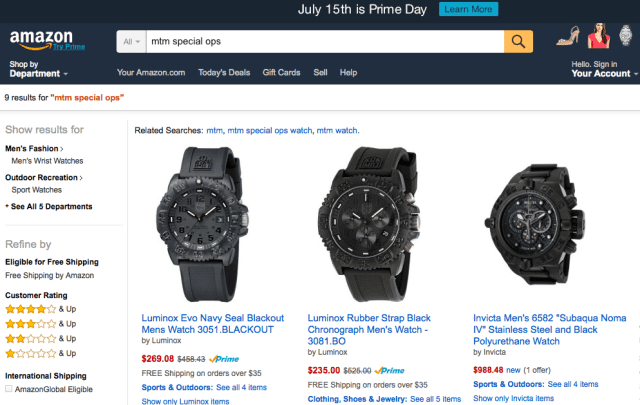7/7/2015
The U.S. 9th Circuit Court of Appeals in San Francisco ruled against Amazon on Monday by allowing a lawsuit over misleading search results to proceed in Los Angeles federal court. By a split 2-1 decision, the judicial panel ruled that specialty watchmaker Multi Time Machine (MTM) can pursue its trademark infringement suit against the retail giant for using misleading search results to steer customers toward buying from MTM’s competitors. MTM does not sell its products on Amazon; however if an Amazon user were to type “MTM Special Ops” (a specific model of watch), search results appear listing other brands sold on Amazon. The competing brands are displayed even though the “MTM Special Ops” tag remains in the search bar and visible to the consumer as opposed to stating that Amazon does not carry the item. MTM sued Amazon in 2011, but the lower court in Los Angeles ruled in 2013 that Amazon’s use of MTM’s trademark did not “create a likelihood of confusion as a matter of law.” With few exceptions, rulings on trademark lawsuits over the use of keywords on internet search sites in recent years have been fruitless for the trademark holder.

Courtesy of Ars Technica/Amazon
The key issue is the phrase “use of commerce” in the Lanham Act. The appeals panel disagreed with the lower court’s opinion that the use of a specific brand’s item as a key word did not meet the use of commerce threshold. The majority panel agreed with MTM’s assertion that even if the consumer ultimately understood that they were not purchasing an MTM watch, the search result format was enough to cause “initial interest confusion.” Writing for the majority, Judge Carlos Bea said, “A jury could infer that users who are confused by the search result will wonder whether a competitor has acquired MTM or is otherwise affiliated with or approved by MTM.” Judge Bea cautioned MTM, however, writing that MTM will not persuade a jury to rule in its favor unless the company can prove that Amazon has caused a “likelihood of confusion,” but the company should be granted the opportunity to make its case. In his dissent, Judge Barry Silverman likened the search results to a diner that tells customers that they only have Pepsi when they ask for a Coke. Silverman wrote, “No reasonably prudent consumer accustomed to shopping online would likely be confused.”
If MTM is successful in its attempts to win compensation from Amazon, it would be significant on two fronts. From a practical standpoint, it could rekindle what is officially a dead area of trademark law. According to expert and Santa Clara University professor Eric Goldman, writing in Forbes last month, that Google and Yahoo successfully defeated the last remaining keyword lawsuit. A successful verdict may inspire other trademark holders to sue individual online retailers as opposed to search engines. Amazon lost another lawsuit in 2014 to cosmetics retailer, Lush, for similar reasons, although a quick search now indicates that the brand is currently sold on Amazon’s site. On a more theoretical level, the appeals panel ruling, albeit by narrow decision, could potentially widen the “use of commerce” clause in the Lanham Act. A more liberal application of the phrase could give trademark holders additional ammunition to what is generally a difficult area of law to prove.
Sources:
Ars Technica – Joe Mullin
Consumerist – Ashlee Kieler
Fast Company – Pavithra Mohan
Reuters – Dan Levine


Join the conversation!